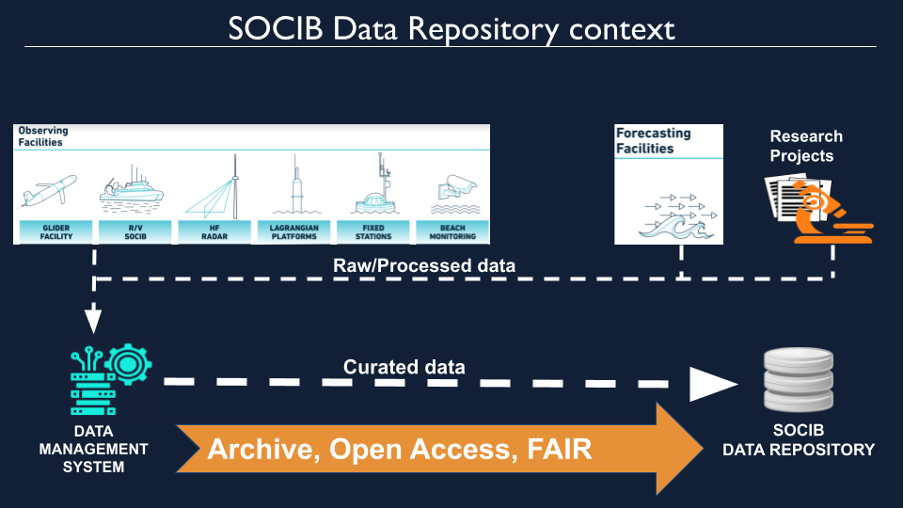Overview of Services
The SOCIB Data Repository is the main outcome of the Data Management Program implemented by SOCIB. The repository contains data, from the nearshore to the open ocean, and at a wide range of spatial and temporal scales, from different Essential Ocean Variables (EOVs) covering from physics and climate (sea water temperature, seawater salinity, currents, sea surface height, etc.) to biogeochemistry (nutrients, oxygen, turbidity, etc.) and cross-disciplinary (ocean colour, etc.). In addition, surface atmosphere variables (atmospheric pressure, wind velocity, and direction, air temperature, and humidity, etc.) included among the Essential Climate Variables (ECVs) can also be found. The repository also plays a key role in the implementation of the FAIR principles by offering 3 different user interfaces depending on the purpose of the access:
- The SOCIB Data Catalog is a web application built on top of the SOCIB Data API services, that enables a friendly discovery, visualisation and download of the data available at the repository. It is also the recommended point of entry for non-operational users that are interested in the oceanographic data produced by the SOCIB’s observing facilities. In addition, SOCIB is minting its own DOIs to data products included in the repository. Worth mentioning, the Data Catalog is powering the related DOI landing pages.
- The SOCIB Data API is composed of a collection of REST end-points that enable M2M (Machine to machine) data and metadata harvesting regarding multiplatform observations and data products. It is also recommended for third-party aggregators, enabling them to obtain Real-Time data and up-to-date reprocessed datasets.
- The SOCIB Thredds Data Server provides standard data services (e.g. OPenDAP, WMS) and allows data download. It also includes a web catalogue for browsing the data and links to data viewers developed by SOCIB. It is recommended for data scientists or software developers aiming to rely on the standard services provided.

Who is it for?
SOCIB promotes knowledge transfer by establishing bidirectional links and continuous cooperation between science, public administration, and the business sector, fully aligned with the open science EU strategy. To this end, it designs and implements tools and services to respond to the needs and requirements of 10 strategic sectors, science and innovation; coastal communities, beaches and tourism; governance and public management of the ocean and coast; marine conservation and sustainable ecosystems; maritime trade and navigation; extreme risks and safety; climate and adaptation; ocean health; ocean forecasting; education, social commitment and ocean literacy).
Why is it important to JERICO-RI and Ocean Data?
By means of its data repository, SOCIB is providing coastal ocean data to the JERICO-RI community and users. In addition to this, data is distributed through the main European marine data portals as indicated in the JERICO-S3 Data Management Plan (D6.1). In particular, the SOCIB Data API is a key tool to distribute RT data towards the Copernicus Marine Service.
Since the beginning of JERICO-S3, efforts have been made to improve the SOCIB Data Repository including both the data assets within, and related services to ensure the provision of quality data. To name a few: transition to the HTTPS protocol, dockerisation of the services, services monitoring improvement, extension of the Data API with new end-points and filter criteria, etc. A significant achievement has also been the obtention of the CoreTrustSeal certification, a recognition of the trustworthiness of the repository to users.
What’s next?
In the last year of the project, the SOCIB Data Repository web pages and Data Catalog will be fully improved with a new web design and functionalities, aligned with the SOCIB brand identity update. In addition, user registration will be included to provide better and custom user experience. Specifically, the latter will allow us to better measure the Virtual Access (VA) and, consequently, to improve the reporting of related metrics when requested. Finally, it is expected that new data types will be included in the Data Catalog (currently only observational data is exposed), such as the model outputs produced by SOCIB.
